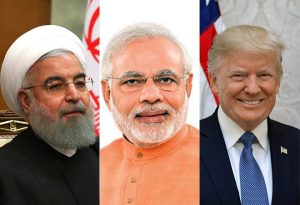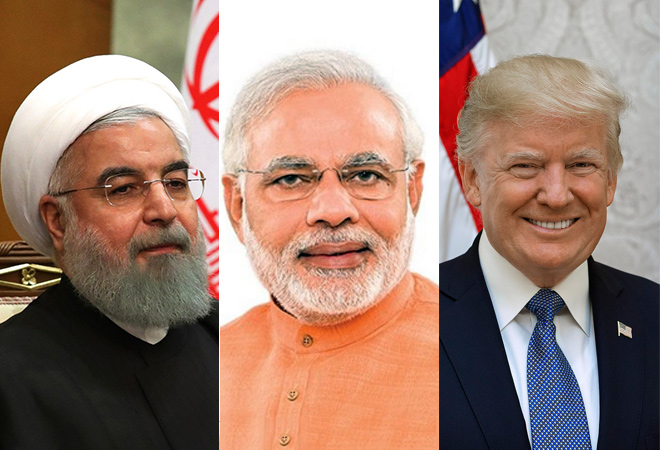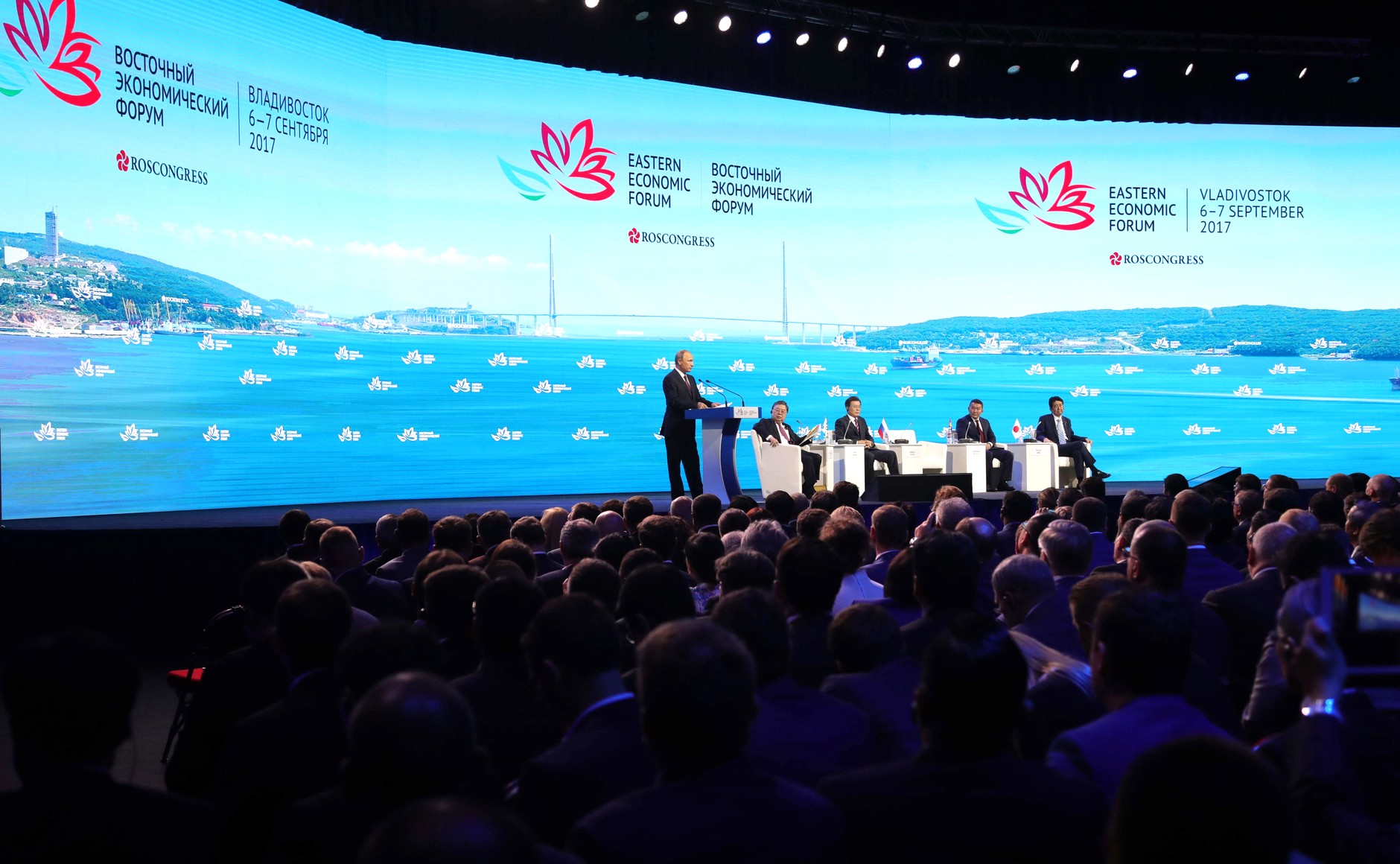India, Iran and the strategic Implications of the US pull out from the JCPOA
KM SEETHI
Countercurrents, 3 June 2018/Global Research 4 June 2018

The decision of the Trump administration to pull out of the Joint Comprehensive Plan of Action (JCPOA)—a major international agreement to address the Iranian nuclear programme—set in motion a wave of reactions across the world. President Trump terminated the US “participation in the JCPOA, as it failed to protect America’s national security interests.” He said that the JCPOA “enriched the Iranian regime and enabled its malign behavior, while at best delaying its ability to pursue nuclear weapons and allowing it to preserve nuclear research and development.” Trump also “directed his Administration to immediately begin the process of re-imposing sanctions related to the JCPOA.” The re-imposed sanctions are expected to “target critical sectors of Iran’s economy, such as its energy, petrochemical, and financial sectors.” He said that “those doing business in Iran will be provided a period of time to allow them to wind down operations in or business involving Iran.” Trump also warned that “those who fail to wind down such activities with Iran by the end of the period will risk severe consequences” (US, White House 2018).
India, the European Union (EU) and other parties to the deal have their own reasons to express concern over the US pull out. The nuclear deal was signed between Iran and the P5+1 (the five permanent members of the United Nations Security Council – China, France, Russia, the UK, US-plus Germany), and the EU in Vienna on 14 July 2015 with a view to curbing Iranian nuclear programme in return for the lifting of economic sanctions (US, Department of State 2015). It may be recalled that after the US pull out, Tehran sought assurances from the remaining signatories—in particular the Europeans—that its interests were guaranteed or it would go back to resume nuclear activities.
Concerns of the EU members have already emerged from various quarters. Former Austrian Chancellor Wolfgang Schuessel said that the Iran nuclear deal was a binding multilateral agreement, and the US withdrawal amounts to violating international norms. Schuessel said: “Europe, Russia, China, international traders should stand up and challenge the American decision in the United Nations and in the WTO. We have to stand up against it. It’s a question of principle. After World War II, we created a very positive empire of norms, and we should defend these norms and standards” (Tehran Times, 30 May 2018). According to Peter Jenkins, former UK Ambassador to the IAEA and UN, “As long as Iran is complying with the JCPOA, the United States, Israel and Saudi Arabia are deprived of any basis for claiming that Iran presents a nuclear threat which must be eliminated by the use of force.” He also said that though it was “likely to result in a loss of economic benefits to Iran, the Europeans, Russia and China are likely to look for as many ways as possible of compensating for that economic loss” (Tehran Times, 28 May 2018). In a statement, Federica Mogherini, the EU’s foreign policy chief, said that the 28-nation bloc would be united in preserving the international nuclear deal. She said that member states were closely coordinating their efforts “to protect the economic investments of European businesses that have legitimately invested and engaged in Iran” during the past three years since the nuclear deal was agreed (The National, 28 May 2018).
After hearing Trump’s statement, Chancellor Angela Merkel reaffirmed that Germany and other EU nations would continue to support the deal. Merkel said: “Germany, France and the UK have decided that we will abide by the agreement, and we will do everything we can to see that Iran also abides by its responsibilities in the future.” Merkel, however, took the position that “Iran is, in some respects, a destabilizing force in the Middle East.” Yet, she considered the nuclear deal, in which Iran agreed to discontinue any nuclear weapons development in return for the easing of sanctions, “an important pillar we don’t want to do without” (Deutsche Welle [DW] 9 May 2018). French President Macron said that he regretted the United State’s decision to withdraw from the nuclear deal. Yet, he said, he would work towards a broader agreement that also encompassed Iran’s ballistics programme and regional activities. Macron admitted that “the nuclear non-proliferation regime is at stake” after speaking with Trump (France 24, 8 May 2018).
China also expressed its concern over the American decision to leave the deal. The Chinese foreign ministry spokesperson, Geng Shuang, said that the Iran nuclear deal was a multilateral agreement reached after negotiations among six countries and that all parties should faithfully implement and safeguard the integrity and seriousness of the deal (Global Times, 9 May 2018). A former Chinese ambassador to Iran reminded that the deal was not abolished. Only the US decided to withdraw from the deal already approved by the UN Security Council. And hence its efficacy would remain with or without the US. However, Trump’s decision only left the US isolated from the international community (Ibid).
Russia’s Permanent Representative to the European Union Vladimir Chizhov said that the nuclear deal would stay in place, regardless of Trump’s position, but there would be problems with its implementation. He said that whatever the White House might say, it would mean that there could be problems on a path of its implementation. But it in no way means it would be broken down. “It is a multilateral document approved unanimously, including by the United States, at the United Nations Security Council in the corresponding resolution.” “So, I am convinced that the rest five nations (Russia, China, the United Kingdom, France and Germany – TASS) will stay committed to this deal, and I hope Iran will stay committed to it too,” he said (TASS, 8 May 2018). Vladimir Yermakov, Director General of the Department for Non-Proliferation and Arms Control at Russia’s Foreign Ministry, also told the media that a US withdrawal from the accord did not necessarily mean the end of the deal. He said: “It might even be easier for us on the economic front, because we won’t have any limits on economic cooperation with Iran. We would develop bilateral relations in all areas – energy, transport, high tech, medicine,” he said. “If the United States breaks an international agreement backed by UN Security Council resolutions, it will be the United States that should suffer the consequences. Neither Iran nor China nor Russia nor the European states should lose out,” Yermakov said (Ibid).
India’s stakes and interests
Trump’s decision to pull out of the deal naturally caused concerns in India, a strategic partner of the US, but one of the largest importers of oil from Iran. Immediately after the news from Washington, the Ministry of External Affairs put out a press release. It stated: “India has always maintained that the Iranian nuclear issue should be resolved peacefully through dialogue and diplomacy by respecting Iran’s right to peaceful uses of nuclear energy as also the international community’s strong interest in the exclusively peaceful nature of Iran’s nuclear program. All parties should engage constructively to address and resolve issues that have arisen with respect to the JCPOA” (India, MEA 2018a). Later, India’s External Affairs Minister Sushma Swaraj stated that India, a long-time importer of oil from Iran, only complies with United Nations-mandated sanctions and “not any country-specific sanctions.” The press release of the MEA, after meeting of the Iranian foreign minister Javad Zarif with the Indian counterpart Sushma Swaraj noted that “all parties to the agreement should engage constructively for peaceful resolution of the issues” (India, MEA 2018b).
India’s immediate responses on this question show that it finds it difficult to make any compromise on the current transactions with Iran. Trump’s decision may have long-term consequences in the background of India’s growing oil imports, especially when Iran continues to be India’s third largest source of supply of crude oil, after Saudi Arabia and Iraq. Also, any price hike in crude oil would have its biggest impact on India’s current account deficit. China and India are the first and second largest buyers of Iranian crude oil. It may be noted that during the visit of Iranian President Hassan Rouhani’s visit to India, there was an understanding that India would increase its oil imports from Iran. It was reported that India had agreed its refiners would raise their crude purchase by half a million barrels a day (or 25 million tonne) in 2018-19, marking an increase of 25% over the 370,000 barrels per day (18.5 MT) estimated for 2017-18. During 2016-17, India had imported 510,000 barrels per day (25.5 million tonne) of oil from Iran (Times of India, 18 February 2018). It was also at this time that India had made its commitment to participate in the development of the Chabahar Port project (India, MEA 2018c). All these commitments are likely to be affected by the US pull out.
It is significant to note that India pays its oil bill to Iran in Euro by making use of the facilities available through the European banking system. Hence it is a critical challenge that India can only import oil from Iran as long as EU does not re-impose sanctions. For India and other buyers, the Iranian oil is profitable insofar as Teheran provides three months of credit. Earlier, when the sanctions were in place (with the EU joining the US), India had utilized a Turkish bank facilities to pay the import bill. Later, since 2013 Iran even allowed the payment in rupees until alternative channels were ready. As sanctions were eased in 2015, India was able to clear its dues.
India has long been under pressure to isolate Iran. The US utilized an opportunity to trap India in its anti-Iranian campaign by passing a domestic legislation in 2006. The occasion was the signing of the 123 Agreement for civil nuclear cooperation. Under the Henry J. Hyde United States-India Peaceful Atomic Energy Cooperation Act of 2006, which created the legal basis for co-operation between the United States and India, Washington sought to “Secure India’s full and active participation in United States efforts to dissuade, isolate, and, if necessary, sanction and contain Iran for its efforts to acquire weapons of mass destruction, including a nuclear weapons capability and the capability to enrich uranium or reprocess nuclear fuel, and the means to deliver weapons of mass destruction” (US, Govtrack 2006). Though the Hyde Act was not binding on India, Washington sought to test India’s ‘credibility’ on its position on Iran as a sort of precondition for inking the 123 Agreement. As such in November 2009, India again joined the US in voting against Iran in a resolution passed by the IAEA censuring Tehran over its controversial nuclear programme and demanding that it stop uranium enrichment. In 2005 and 2006 also, India voted in a similar way against Iran.
Interestingly, even as India fell in line with the Western strategic thinking on Iran, it sought to sustain a different position defying Western sanctions. India continued to engage Tehran to ensure a healthy trade relationship. The import of oil was not affected badly as India sought to find alternative routes to do business with Iran. In early May 2013, India and Iran decided to step up their bilateral relations in all aspects including connectivity for which New Delhi would be assisting in the upgradation of the strategically crucial Chabahar port located in south eastern part of Iran (Seethi 2015). During a meeting between the foreign ministers of India and Iran, the two sides agreed to work on a trilateral transit agreement involving India, Iran and Afghanistan (India, Ministry of External Affairs 2013). Tehran saw this important not only for Iran and Afghanistan, but for the entire Central Asia. The two countries reiterated the significance of greater connectivity between Russia, Central and South Asia through the International North South Transport Corridor (INSTC). India viewed this project as part of reinforcing its ‘Connect Central Asia’ and ‘Look West’ policy. Given India’s sensitive relations with Pakistan, New Delhi saw the Chabahar port as an alternative route not only to Afghanistan, but also to resource-rich Central Asia. It may also be noted that India was keen to open alternative routes to Afghanistan ever since China took over Pakistan’s Gwadar Port (a warm-water, deep-sea port located in the Arabian Sea at Gwadar in Baluchistan province), which is about 76 km from the Chabahar port. The Chabahar port, surrounded by a free trade zone, is vital particularly since Islamabad does not permit transit facility from India to Afghanistan (Seethi 2015).
With the US pull out, India’s growing interest in Afghanistan and Central Asia is now at risk. The Chabahar port is set to give a transport corridor to Afghanistan, providing the landlocked country a new facility to have a deepened Indian Ocean trade. Now that a fresh US sanctions are round the corner, the agencies involved in the port project are apprehensive about the US retaliation for engaging Iran. Though the Modi Government is claiming that it still sustains ‘strategic autonomy,’ it remains to be seen if it can ignore the strategic imperatives of the emerging Indo-Pacific collaboration where both New Delhi and Washington have vital stakes.
References
India, MEA (Ministry of External Affairs) (2018a): “Official Spokesperson’s response to media queries on the recent developments regarding the JCPOA,May 09, 2018,” http://www.mea.gov.in/media-briefings.htm?dtl/29880/Official_Spokespersons_response_to_media_queries_on_the_recent_developments_regarding_the_JCPOA
India, MEA (Ministry of External Affairs) (2018b): “Transcript of Weekly Media Briefing by Official Spokesperson, May 10, 2018,’ http://www.mea.gov.in/media-briefings.htm?dtl/29886/Transcript_of_Weekly_Media_Briefing_by_Official_Spokesperson_May_10_2018
India, MEA (Ministry of External Affairs) (2018c): “India-Iran Joint Statement during Visit of the President of Iran to India, February 17, 2018),” http://www.mea.gov.in/bilateral-documents.htm?dtl/29495/IndiaIran_Joint_Statement_during_Visit_of_the_President_of_Iran_to_India_February_17_2018
India, MEA (Ministry of External Affairs) (2013): “Joint Press Statement on 17th India-Iran Joint Commission Meeting, May 4, 2013,” http://www.mea.gov.in/press-releases.htm?dtl/21652/Joint+Press+Statement+on+17th+IndiaIran+Joint+Commission+Meeting
Seethi, K.M. (2015): “The Global South and Non-Alignment: Challenges of Indian Diplomacy in the Gulf,” The Journal of Political Economy and Fiscal Federalism, Vol.1.
Seethi, K.M. (2013): “India and the Emerging Gulf: Between ‘Strategic Balancing’ and ‘Soft Power’ Options,” in Tim Niblock and Monica Malik (eds.), Asia-Gulf Economic Relations in the 21st Century: The Local to Global Transformation, London: Gerlach Press.
US, White House (2018): “President Donald J. Trump is Ending United States Participation in an Unacceptable Iran Deal, May 9, 2018,” https://www.whitehouse.gov/briefings-statements/president-donald-j-trump-ending-united-states-participation-unacceptable-iran-deal/
US, Department of State (2015): “Joint Comprehensive Plan of Action,” https://www.state.gov/e/eb/tfs/spi/iran/jcpoa/
US, Govtrack (2006): H.R. 5682 (109th): Henry J. Hyde United States and India Nuclear Cooperation Promotion Act of 2006, https://www.govtrack.us/congress/bills/109/hr5682/text



